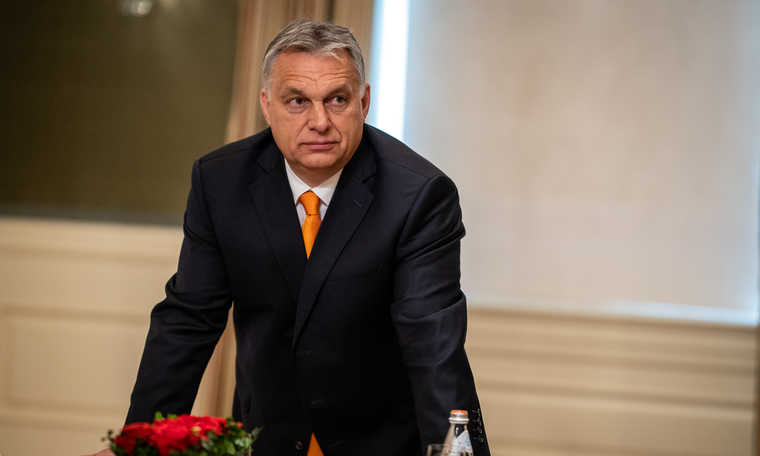By: V4 Agency
Countries must quickly purchase as many coronavirus (SARS-CoV-2) vaccines as possible, regardless of whether they come from the East or the West, Prime Minister Viktor Orban said in an interview to German news portal Focus Online, in response to a question about Hungary’s decision to buy Russia’s Sputnik V vaccine.
During a pandemic, a politician’s job is to live up to the trust placed in them, and to shoulder responsibility for protecting their citizens’ lives and health, the Hungarian premier said. Therefore, we must fight the pandemic and procure as many vaccines as possible, and as quickly as possible. Those who gain time, gain lives and gain freedom, he added.
There’s no such thing as Eastern or Western vaccines; only good or bad ones. The Hungarian authorities guarantee the efficacy of vaccines, he stressed. When the Hungarian authorities conclude that a vaccine is safe and effective, they authorise it.
“From that point on, to me, a vaccine that has been granted authorisation is a Hungarian vaccine I can use to save the lives of my compatriots,” PM Orban said.
The prime minister said it was possible to treat the procurement of vaccines and the tense relations between the European Union and Russia as separate issues. He underscored that human life and the protection of health took precedence over political consideratons, including geopolitical considerations as well. It’s irresponsible to turn vaccines into a political issue, and to let people die simply because there are political objections to a particular manufacturing country.
“Looking at it objectively, it’s clear that the eastern part of Europe developed a vaccination culture during the communist era which led to eastern Europe eradicating the polio virus a lot sooner than western Europe, where the Russian vaccine was not adopted for ideological reasons,” PM Orban said.
Asked about the European Union’s centralised vaccine procurement programme, Mr Orban said it had become clear that “this was the wrong decision”. The United States, Britain, Israel and even Serbia “are well ahead of us EU member states”, he said, adding that it was now “too late” to change course and “complaining is pointless”.
“Let the European Commission do what it has to do,” PM Orban said. “We won’t get in its way and we’ll support it wherever we can, but out of responsibility for our people, we’ll exercise our national competences.”
Asked why he did not consider Hungary to be bound by the EU decision on vaccine procurement, Viktor Orban said, “Brussels follows its own logic. It doesn’t take into consideration the importance of the time factor and is too slow to issue approvals and doesn’t appear to be talking to suppliers from a position of strength.”
However, EU regulations do not bar member states from acting on their own, and the Hungarian government has taken advantage of this, he added.
“I don’t know exactly what’s happening in Brussels or in the minds of the Brussels bureaucrats, but what I do know is that everyone who has died was someone’s father, mother, sibling or child. This consideration overrides European politics. The absolute priority is the health and freedom of our citizens,” Viktor Orban said in response to the remark that some believed the EU was also motivated by ideological considerations in its vaccine procurement programme.
Asked about Brussels’s strategy regarding its vaccine procurement that intended to show that the EU was stronger together than as individual member states and to demonstrate Europe functions as a united, centralised state, PM Orban said, “The value of any strategy lies in how successful it is. In those areas in which joint action brings about success, we must take joint action; wherever a national path brings about success, that is the one which must be pursued.”
“We’ve sought to do something together that we could have managed more successfully on an individual basis – take a look at the examples of Britain or Serbia,” Viktor Orban noted.
Put to him that several governments believed the EU could only challenge the US, Russia and China as a united bloc, Mr Orban said he did not support those who “want to bring back Cold War politics”. The prime minister said he believed Russia and China were much more of “a big opportunity for Europe”, adding that the bloc should “look for forms of cooperation that serve our interests”.
Concerning the state of Europe’s economy, Mr Orban said things were “going well” in central Europe. The region’s economic indicators, he said, were “excellent”, the budget “is in the best possible shape” and “our labour-based policies have resulted in near full employment”. Central Europe was also “progressing well when it comes to digitalisation”, he added. Western Europe, on the other hand, “is pursuing an economic policy that’s too reminiscent of socialism,” he said, arguing that governments were raising taxes and implementing “complicated regulations” that hindered investment and businesses.
“The EU should do far more to promote improved competitiveness; but regrettably its share of global economic production is declining, and we find this alarming,” Mr Orban said.
Regarding the issue of migration, the prime minister stressed, among other things, that that EU’s policy was “based on a misconception” and “creates illusions in people living in war zones”, thus “turning the Mediterranean into a cemetery”.
He also said that Hungary intends to cope with its demographic challenges via “strong family policy measures,” and “not by inviting immigrants”.
“The Germans want to force their own pro-immigration policy on us. I have to reject that,” he stressed.
He explained that Hungarians respect the Germans’ decision and their vision for the Germany of the future and the role of Christianity and national feelings. “All we ask is for them to also respect our decision,” the prime minister said.

